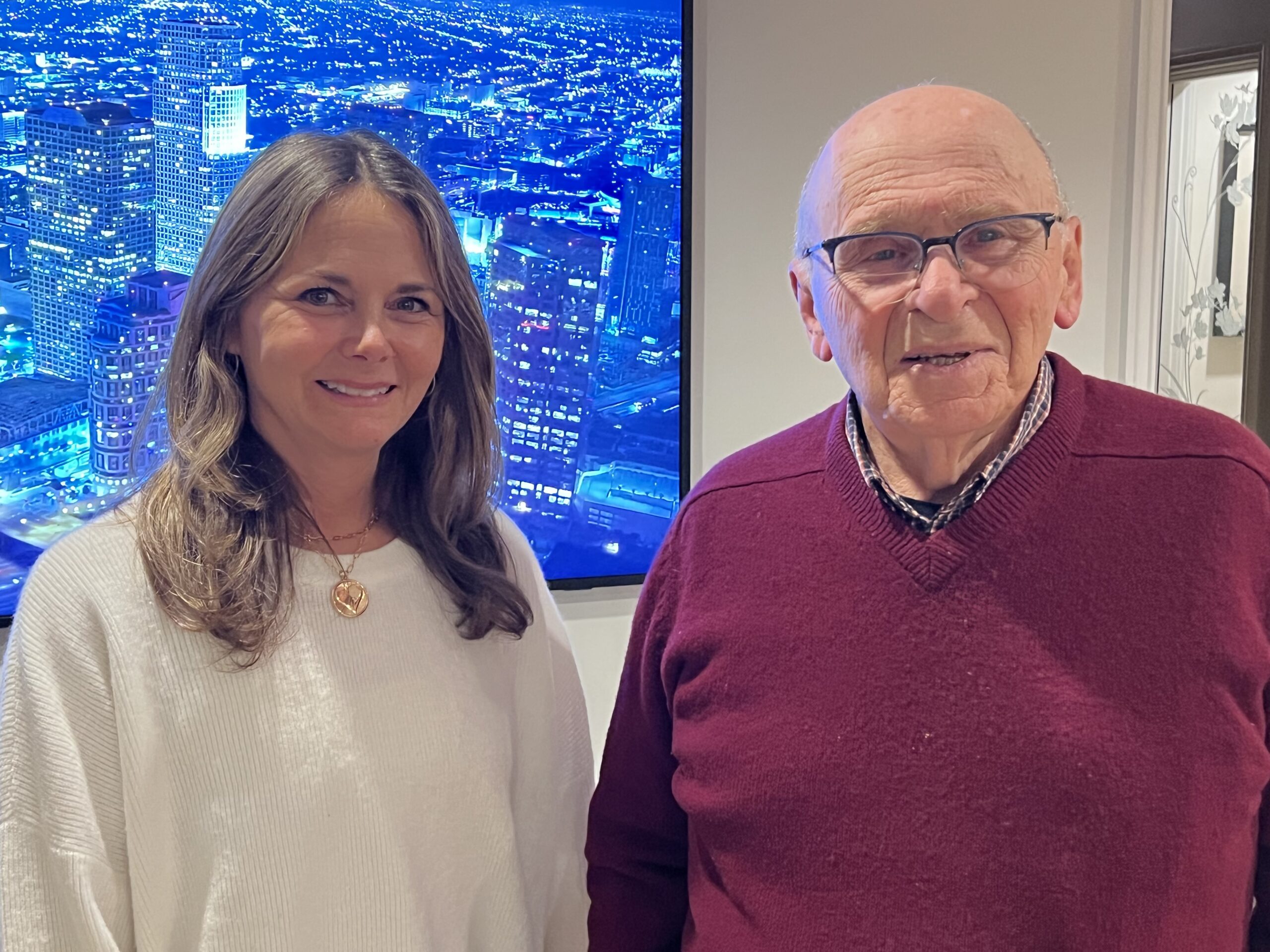His father’s skills as an electrician and auto mechanic likely saved Peter Stern’s life during the Holocaust.
Stern discussed his experience as a German Jewish child who survived the Holocaust with the Anti-Defamation League Main Line Community Action Group on Tuesday.
“When we do a program, we tell students they are the last generation to meet a survivor,” said Lise Marlowe with the Holocaust Awareness Museum and Education Center (HAMEC). “And once you meet a survivor, it’s your responsibility to tell their story. It’s also your responsibility to stand up and speak up to those Holocaust deniers that, sadly, they will meet in the world.”
She noted the Nazis killed 94 percent of the Jewish children in Europe because they couldn’t work as slaves. Before World War II, there were 1.6 million Jewish children in Europe, and the Nazis killed 1.5 million.
Stern, a Lower Merion resident, said his family lived in Nuremberg, Germany.
Stern, who was born in 1936, has a given name of Peter, but his brother, who was born three years later, is Samuel.
“The reason that I have an Aryan name and my brother does not is the Nuremberg Laws that were passed in 1935,” said Stern. These were laws passed to restrict Jews from various aspects of life, including practicing medicine or law. One law said that Jewish children “born in Germany had to have Jewish names.”
While the laws were passed in 1935, the Olympics were held in Berlin in 1936, and the Nazis “did not want that bad PR,” so they weren’t enforced until after the Olympics.
His dad, an electrician, owned an auto mechanic business, but because of the Nuremberg Laws, he had to sell it. Their family was forced to go live in a “Jew house” with four or five other families in an area near the train tracks. But his father found a job at a Jewish school teaching boys how to be mechanics.
In November 1941, Stern’s family was deported to Riga, Latvia. He was 6 years old.
“The term used was ‘resettlement,’” said Stern. “It was something the Jews in Germany believed was true. [But] it was a euphemism for murder.
“When we got there, that train, all the people were taken to a place called Jungfrenhof, which was the first concentration camp in Riga,” said Stern.
It was a former farm. It was snowy and cold. They marched to old stone barns with no heat or running water. Close to 4,000 people were in that camp. By the end of the war, only 149 survived.
But his family was sent to the Riga Ghetto shortly afterward. In the forest outside Riga, the Nazis had marched 20,000 people into the woods and killed them to make room in the ghetto for more people. On a map, Stern showed sites of Nazi slaughters around Europe and concentration camps, “really killing camps.”
Then, his family went to an apartment building where German soldiers also lived. His father would take his students to fix German army vehicles. Others living in the house sorted the clothing of the people who were killed. After a few months, his family was sent to Russia, where his father and the mechanic students fixed German army vehicles. Stern and his brother played with German officers’ children.
At one point, his father was taken to fix vehicles closer to the front, where an attack took place. His father rescued the German commander and an officer, he said.
The Germans began retreating and took Stern’s family with them.
“We were sent to the Men’s Civil Prison in Riga. And for three months, we lived in one cell, on the second or third floor,” he said. In December 1943, they were put into a basement cell.
“This is the first time I truly remember my parents being scared,” he said.
The soldiers then took them back to Germany, riding in truckloads of clothing. They would hide underneath the clothing at checkpoints. In Berlin, they were brought before a judge who scolded his parents and sent his father to Buchenwald, where he died of typhus.
Stern, his mother, and his brother were interned in Ravensbruck, the only women’s concentration camp. There Nazi doctors performed medical experiments on some inmates. A gas chamber and crematorium were on the grounds.
As the Russian army approached, the Sterns were loaded on a cattle car to Bergen-Belsen, another concentration camp, where the conditions were even harsher.
“On April 15, 1945, we were rescued,” said Stern. He was 9 years old when his family was liberated. His mother had brothers in the U.S., and they were eventually able to emigrate. Stern studied metallurgy and became a science teacher in Connecticut, retiring after 30 years. Stern and his wife, Julie, have a grown son.
Stern didn’t talk about the Holocaust for many years, nor did his mother, who remarried. As an adult, he continued to take courses and one was on fascism. The professor assigned a paper on the Holocaust.
“I couldn’t do it. I approached him. He said, ‘Could you write about what you went through.’ And I did. I didn’t truly start talking [about the Holocaust] until after I wrote that in 1985…I started to speak and never stopped.”
About the recent increase of antisemitism in the U.S., he said, “In some ways, I’m scared sh**less, OK? But it isn’t just a question of antisemitism. It’s the ‘anti’ aspect and what kids will do. They will pick on weakness.”
“There’s a word we have that we should all start to believe in and use, and that word is empathy.”

